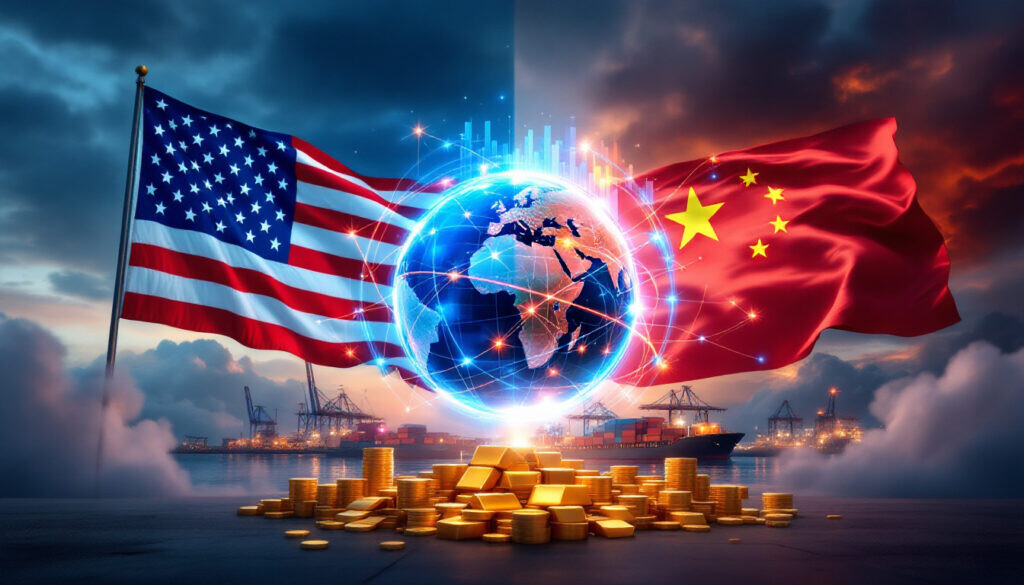
The world is standing at a geopolitical and economic crossroads. The era of globalization that defined the late 20th and early 21st centuries, characterized by free-flowing trade and interconnected finance, is giving way to a new reality. According to a recent analysis by Wells Fargo, the global economy is entering a “second era of deglobalization,” a period marked by the fragmentation of global commerce and finance into rival blocs led by the United States and China. This shift, driven by deteriorating geopolitical relations and a re-evaluation of national interests, promises to reshape the very foundations of the global economic system, with profound consequences for trade, investment, and international cooperation.
The core of the Wells Fargo framework is a move away from a single, integrated global economy. Instead, the world is seen as coalescing into distinct, competing spheres of influence. Countries with shared views on geopolitics, foreign policy, and domestic economic priorities are naturally forming alliances and strengthening ties with their ideological counterparts. The report warns that this trend will lead to a gradual but significant erosion of economic connections between these rival blocs. Over time, cross-bloc trade will diminish, capital flows will slow or cease entirely, and broader financial and diplomatic relationships will eventually be severed. This is not a sudden collapse but a slow, deliberate unwinding of decades of integration, driven by a strategic imperative to reduce dependencies on potential adversaries.
The primary catalyst for this fragmentation is the increasingly fraught relationship between the world's two largest economies. Despite periods of trade truces and tariff adjustments, Wells Fargo observes a sharp recession in "cooperation in the broadest sense of the term" between the U.S. and China. Both nations are no longer pursuing deeper economic integration but are instead focused on "reducing dependencies." This marks a fundamental paradigm shift from the mutually beneficial relationship of the past to a strategic competition for dominance and self-sufficiency. The implications are enormous, as global supply chains built on the assumption of a stable U.S.-China relationship now face a future of uncertainty and potential disruption.
In this emerging bipolar world, a clear pattern of alignment is already taking shape. The Wells Fargo analysis suggests that most G10 countries—the world's most economically advanced nations—will align with the United States, cementing a Western-centric bloc. Simultaneously, many nations across Asia and Africa are expected to lean toward China, drawn by its Belt and Road Initiative, growing economic might, and an alternative to Western-led institutions. This division creates a new map of global commerce, where trade routes, investment flows, and technological standards are increasingly dictated by geopolitical allegiance rather than pure economic efficiency.
However, not all regions fit neatly into this dualistic framework. Latin America, in particular, emerges as a potential geopolitical "battleground." The Wells Fargo analysts note that neither the U.S. nor China holds a dominant position in the region, leaving it "most split." This dynamic could make Latin America a key theater for competition as both superpowers vie for influence, investment opportunities, and access to resources. For countries in this region, navigating the competing demands of Washington and Beijing will be a delicate balancing act, with potential economic benefits and risks depending on their strategic choices.
The rise of these blocs also presents a significant challenge for nations that seek to remain neutral. The report warns that attempting neutrality "might not be tenable" over the long term. As the world fragments, countries will face increasing pressure to choose sides, as their economic and political futures become intertwined with one of the two dominant powers. A neutral stance could lead to economic isolation, as nations find themselves on the fringes of major trading blocs, unable to benefit from the preferential agreements and strategic partnerships that define the new economic order.
The economic consequences of this fragmentation are multi-faceted and potentially severe. For decades, the global economy prioritized efficiency, with companies building complex, just-in-time supply chains that spanned continents to minimize costs. In a bipolar world, the focus will shift from efficiency to resilience and security. "Friend-shoring" and "near-shoring" will become the new mantras, as countries and corporations seek to bring production back home or relocate it to allied nations. This will likely lead to higher manufacturing costs, increased consumer prices, and slower global economic growth.
The financial system will also undergo a profound transformation. The cessation of cross-bloc capital flows could lead to the emergence of parallel financial systems. The U.S. dollar's dominance, while still robust, could be challenged within the Chinese bloc, where alternative currencies and payment systems could gain traction. This financial fragmentation would add complexity and risk to international transactions, making it harder for capital to find its most productive uses globally.
Despite these significant trends, Wells Fargo concludes that the global economy is "still far from full fragmentation." The final alignments and the full impact of this shift are yet to be realized, and they will continue to evolve alongside trade and geopolitical changes. The current state is a transitional phase, one where the old rules of a single, interconnected world are no longer fully applicable, and the new rules of a bipolar world are still being written. The journey into this second era of deglobalization will be complex and challenging, demanding strategic foresight and adaptability from nations and businesses alike. The U.S.-China bipolar world is not just a geopolitical concept; it is an economic reality that will shape our collective future for decades to come.
[Copyright (c) Global Economic Times. All Rights Reserved.]





























